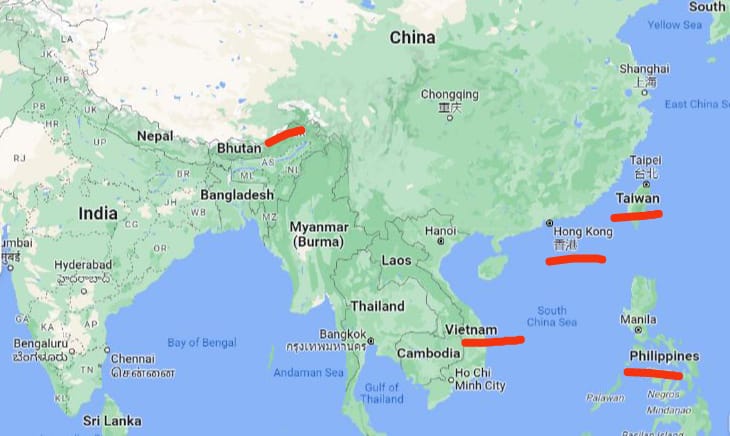Several Asian nations, including the Philippines, Malaysia, Vietnam, and Taiwan, have united in rejecting China’s latest national map, strongly condemning Beijing’s territorial claims. This collective response came after China published an updated version of its national map, asserting sovereignty over disputed areas in the South China Sea. India was among the first to voice its objections, followed by other nations.
India’s External Affairs Minister, S. Jaishankar, firmly protested against China’s “standard map,” which laid claim to Arunachal Pradesh and the Aksai Chin. He emphasised that such claims did not alter the reality of India’s territorial boundaries and criticised China for making “absurd claims.”
The Philippines issued a scathing response to China’s 2023 edition of its “standard map,” which still depicted Philippine features in the contentious West Philippine Sea. The country’s Foreign Affairs Spokesperson, Ma. Teresita Daza, asserted that China’s actions had no basis in international law, particularly the United Nations Convention on the Law of the Sea (UNCLOS). Daza referenced the 2016 Arbitral Award, which invalidated China’s nine-dashed line, and called on China to adhere to its UNCLOS obligations.
Manila had previously protested against a Chinese national map in 2013 that included parts of the Kalayaan Island Group, also known as the Spratlys, within China’s “national boundaries.”
Malaysia joined the chorus of dissent by announcing its intent to send a protest note to China over its claims in the South China Sea, as delineated in the “China Standard Map Edition 2023.” Malaysia’s Foreign Minister, Dr. Zambry Abdul Kadir, reiterated the country’s position, emphasising that Malaysia did not recognize China’s claims in the South China Sea and stating that the map held no binding authority over Malaysia.
Vietnam strongly denounced China’s provocative actions, reaffirming its sovereignty over the Paracel and Spratly Islands and rejecting China’s maritime claims based on the nine-dash line. Vietnam’s Ministry of Foreign Affairs spokesperson, Pham Thu Hang, stressed that China’s claims violated international law, particularly the 1982 UNCLOS. She declared that the sovereignty and maritime claims based on the nine-dash line were null and violated the UNCLOS.
Vietnam further released a statement on September 1, asserting that the map infringed upon its sovereignty over the Spratly and Paracel Islands and its jurisdiction over its waters.
Taiwan’s Ministry of Foreign Affairs emphatically rebuked China’s “standard map” by highlighting that Taiwan had never been ruled by the People’s Republic of China (PRC). Taiwan’s spokesperson, Jeff Liu, stated that Taiwan was a sovereign and independent country, distinct from the PRC. He underscored that these facts were universally recognized and part of the international status quo.
Despite the mounting criticism from neighbouring nations, China maintained its position. Chinese Foreign Ministry spokesperson Wang Wenbin defended the map’s release as a routine practice to raise public awareness of map usage. Wang urged concerned parties to approach the matter with objectivity and rationality.
A coalition of Asian nations, including India, the Philippines, Malaysia, Vietnam, and Taiwan, expressed strong opposition to China’s new national map and territorial claims. These countries cited international law and their sovereignty in rejecting China’s assertions. The situation raised concerns about ongoing territorial disputes in the South China Sea and the potential for escalating tensions in the region. China, while receiving widespread criticism, remained steadfast in its stance and called for a measured response from other parties.

